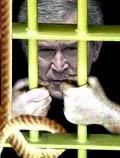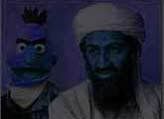| Find |
Thursday, 19 April 2007
Our dead, their dead
 As tragic as the Virginia Tech shootings are, let's face it: 32 dead is a slow day in U.S.-occupied Iraq. "Those whose lives were taken did nothing to deserve their fate," President Bush said. "They were simply in the wrong place at the wrong time." He would know. In America, we have the luxury of mourning our dead for days or even years (see 9/11). If Iraqis tried to "pull together" and "come to grips" with every massacre of innocents...well, you get the idea.
As tragic as the Virginia Tech shootings are, let's face it: 32 dead is a slow day in U.S.-occupied Iraq. "Those whose lives were taken did nothing to deserve their fate," President Bush said. "They were simply in the wrong place at the wrong time." He would know. In America, we have the luxury of mourning our dead for days or even years (see 9/11). If Iraqis tried to "pull together" and "come to grips" with every massacre of innocents...well, you get the idea.In America, we post photos of the man responsible for the latest mass murder on the covers of our newspapers and magazines‹calling him a "madman" and a "psycho." In Iraq, those to blame for hundreds of thousands of deaths remain as nameless and faceless as their victims. They're just doing the job they've volunteered to do. The media, of course, dutifully follows its dog-eared script thus guaranteeing very little critical analysis.
In his book, Endgame, author Derrick Jensen powerfully challenges this curious arrangement when he writes of how the New York Times, after 9/11, published, "profiles of people killed in the attack on the Word Trade Center."
Through these profiles (which were syndicated throughout the country) readers learned, for example of the "efficient executive" who "never forgot the attention to spit and polish, in his work or play," and a top stockbroker: a "prankster with a heart" who'd "pull up next to you in his Porsche-a 911-flip the bird, grin, and take off in the wind." "Imagine how our discourse and actions would be different if people daily detailed for us the lives‹the individuality, the small and large joys and fears and sorrows‹of those whom this culture enslaves or kills," writes Jensen.
Posted at
17:03
![]()
Post Title: Our dead, their dead
Subscribe to:
![[Zionazis-1.jpg]](https://blogger.googleusercontent.com/img/b/R29vZ2xl/AVvXsEg_x8DOGucgHQmfJJujuK_oYJdxhEnskhQqt-Og7lSk52HeaDQYzW8NQWfdpHmPgj_FJN0jJ3tz1prR1jVZHdHky2HDQxxcs4LVxX0DtAt3fG0sfRr6MDx7Sz8cJNjl0k0RS9TbCjangQ/s1600/Zionazis-1.jpg)




